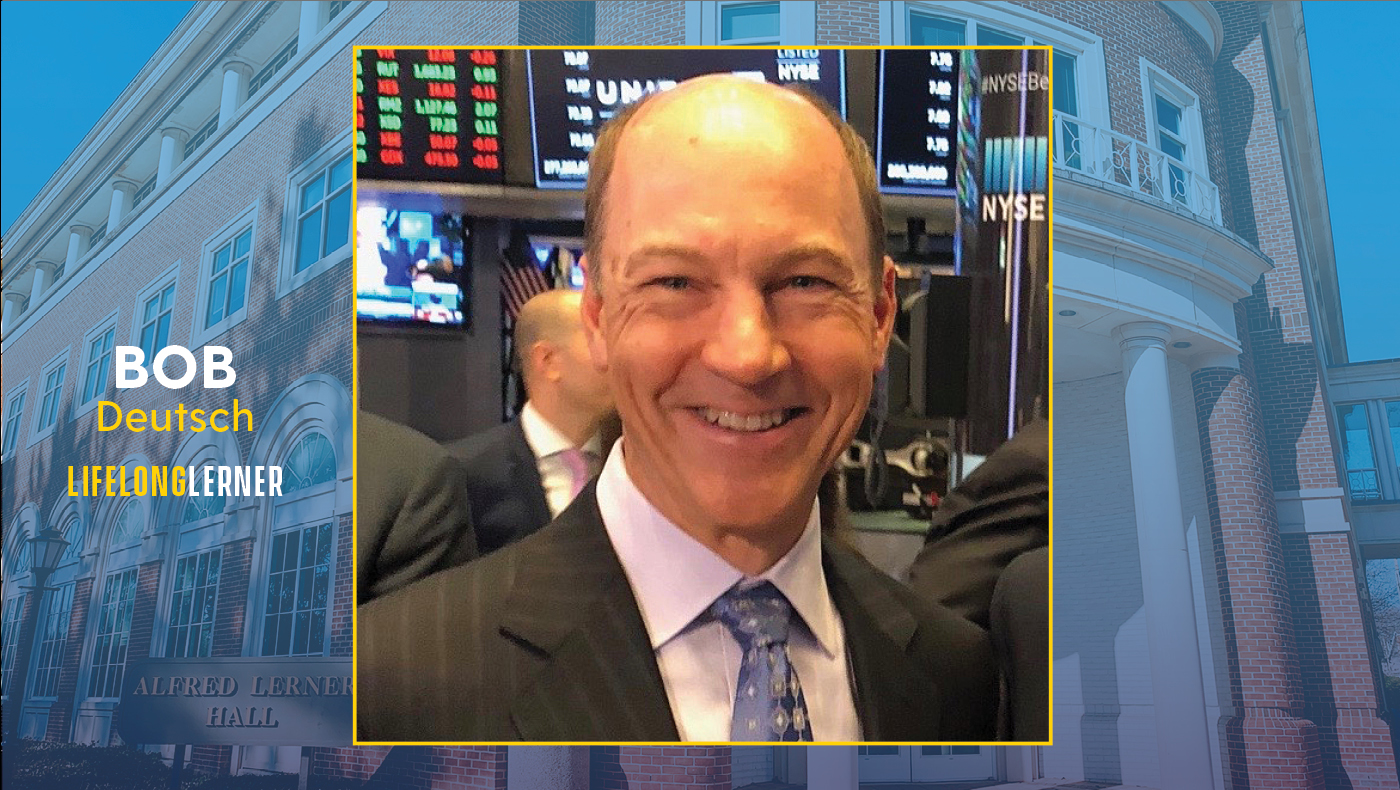In this uncertain time, we look to academic and industry leaders to share their wisdom and help to guide our next steps. We reached out to some outstanding members of our esteemed community, of alumni at the University of Delaware’s Alfred Lerner College of Business and Economics, to share their experiences and guidance with our larger community. Robert Deutsch, UD Class of 1980, sat down with Lerner to discuss lessons learned during the coronavirus pandemic, advice for his fellow Blue Hens and more.
Q: How have you seen businesses respond to the coronavirus pandemic?
Deutsch: I chair the exchange traded fund board, a mutual fund board, at JPMorgan. Watching JPMorgan and other large companies react quickly, get people working at home, have the technology in place and not really miss a step in terms of serving their clients and doing their business—it’s pretty impressive.
I think the perspective on this is that large companies were largely in a place where they could react to this quickly, serve clients and continue doing business. I think where the real challenges are is with smaller businesses, which typically don’t have the resources or the cash on hand or the technology. So it’s a lot tougher on smaller businesses and I think those are the ones that need our help. Fortunately, they’re getting help from the government program.
Q: What is your favorite memory from your time at UD?
Deutsch: The best memories are really about friendships. I think it’s friendships and remembering the people that you get to create friendships with. While learning is absolutely why you’re there, and it’s important that I came out with a good education and I felt relatively well prepared, the memories that stick out more I think are of the people in the friendships. One friend is now my wife!
Q: What pieces of advice would you give to current UD students?
Deutsch: I think COVID-19 is really challenging on younger people. So, despite that some of the health concerns may be greater with the elderly and people who are immunocompromised, I just think the social distancing and what we want to do with COVID is particularly tough for young people because they’re going through a lot of changes. Whether it’s graduations, a job or from one school year to the next, that’s all about relationships.
My first thought is that I really feel for college students and young people going through it because I think it’s a really challenging time for them. My second thought, though, is to give some perspective to it. If this is the worst thing we all go through in our lives, we will be blessed. As bad as this seems, if you read any history or just know what’s come before us, and what our forefathers have gone through, you know that people just in the last hundred years went through tuberculosis, which was a really awful disease, and polio, which affected kids particularly. One of our presidents was in a wheelchair due to polio.
We had fathers and grandfathers who fought in World War II, an awful war, or the Vietnam War. You can kind of go through history and see many challenging times. I think it’s important to put it in perspective that as tough as this is, and I do think it is especially tough on young people, the people who have come before us have also gone through really tough things. Whether it was disease or war related, putting that in perspective we could look at this and say, “Ok, we can really get through this.”
If you can stay healthy, do the social distancing and so on, we’ll get to the point where there’s a vaccine. We’ll get through it, we’ll get past it and we’ll move on. While it’s not fun to go through it, it’s certainly not the worst thing we’ve seen hit humanity in the last hundred years.
Q: What does it mean to you to be a Lifelong Lerner?
Deutsch: It means a couple things to me. I went to the University of Delaware on a scholarship so I think it was always on my mind to come back in some way to help students, whether it was through scholarship or mentoring or other ways. I’ve funded a scholarship, I’m chair of the board with Dean Bruce Weber and I’ve been on that advisory committee to be helpful. We’ve also started this program to help students prepare for jobs, the Lerner Edge program. To me, that’s what it means.
What’s great, especially for students who eventually become alumni, is that the University and Lerner are very open and flexible to how you can come back and be helpful. I’ve seen other Lerner alumni choose different ways to be helpful. Mentoring being one, and that is really helpful to students and I think the alumni get a lot out of it too. I think typically that’s what it’s about, it’s giving back. I enjoy the students, and the University has a lot of great students now who will do great things in the world so getting to help them is a great opportunity. I’ve learned from students, so that’s part of the “learner” part of it.




